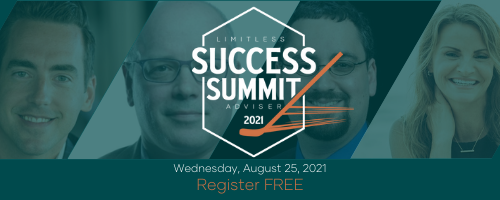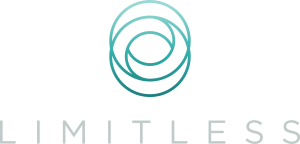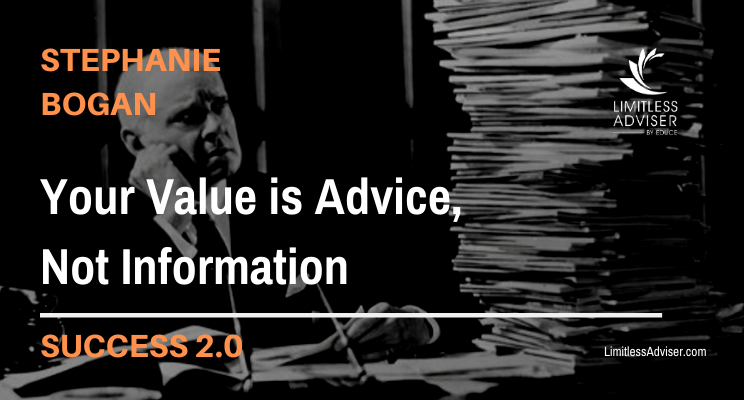I once worked with an advisor who would routinely give clients, at every meeting, a four-inch-thick stack of papers. She was also lamenting her desire to become a “trusted adviser,” not just a planner, and the time and complexity of creating custom plans for every meeting that ran every possible scenario at least 5 different times to ensure that no stone was left unturned preparing for the meeting.
She spent a solid 15 minutes explaining how important those documents and scenarios were – what if the client asked this question, what if the client asked that question, she constantly wondered. When I told her that she didn’t need those documents anymore she argued vehemently.
I then took her through an exercise to help her re-frame her thinking so she could evaluate the situation – and hold her client meetings – from a success state rather than a survival state.
“Did your clients come to the first prospect meeting and tell you what they needed, more than anything, was three inches of paper running every conceivable scenario about their financial life?” ‘No,” she replied. “Who decided to provide inches of paper to talk over in the client meeting?” I asked. She told me, “I did. But I need them, I’ve been giving them to clients since I started as a planner.” “So, to be clear, you set the expectation that the focus of the meeting was the paper, not the clients?” I asked. “Well, when you put it that way, yes, I suppose I did.” I then asked her if clients started their review meetings by asking to review the standard pile of papers. She realized no, they did not. I shared with her what I’ve shared with hundreds of advisers since – your value is advice, not information. That’s not to say you shouldn’t do proper planning, run scenarios or discuss performance; it is to say those are means to an end and the real value you deliver is trusted advice.
Given I’m not a coach of the podium and instead prefer to dispense advice I’ve personally put into practice or closely helped adviser clients implement, I left her with this challenge so that she could learn this most valuable lesson for herself.
I suggested to Susan – and now to you – let clients tell you in no uncertain terms what paper they value so that you can evaluate how best to spend your time preparing for and holding client meetings going forward with this simple exercise.
Run your typical client meeting, paper stacks and all. Then, at the end of the meeting, say the following:
“I know we’ve covered a lot today, and I want to make sure you leave with the information most valuable to you. Take a look at what we covered today (slide plan/papers across the table), and select the pages you’d like us to copy so you can take them home with you to reference later.”
Then, let them select the pages that matter to them. Having engaged this exercise literally hundreds of times with advisers, I can share that less than 5% of clients ask for the stack, where the vast majority select between 2-3 pages to copy.
Let’s be clear – though it will be uncomfortable — you don’t provide 50 pages of paper to help the client, you do it to help yourself.
I distinctly remember the first time my financial planner showed me our financial plan with all the assumptions pages behind it. I felt compelled to review every page, understand it and ask intelligent questions. So, I did what seemed appropriate when presented with 72 pages of data – I reviewed every page and line item looking for “something” without any idea why. I asked a lot of seemingly intelligent but truly mundane questions about that data. Questions like, why does this distribution number look this way at age 72 – and I was 34 at the time. In hindsight, such nonsense.
Fortunately for me, there was a powerful moment that shifted my attention away from the pages and back to my purpose. “What,” my adviser asked, “is the point of your success? What do you want to do with it?” I shared that after taking care of everyone around me since the age of 9 — my mother was mentally ill and my father suffered from Vietnam induced PTSD — I just wanted to be free of the burden of being responsible for everyone and everything in my life.
I was at some deeper level truly terrified that at some point I would lose it all and once again be at the mercy of strangers for food and shelter. I shared with my adviser that my greatest fear was standing with my children in a soup line unable to provide a stable loving environment for them. Because, well, what we all want most is to fill the holes we experienced as children.
Because my advisers were top notch, they took a simple but brilliant approach and asked me (while my spouse listened because this was news to him) what the unemployment rate was in the great depression. About 25%, I said. They went on to ask me if I thought I’d be one of the 25%, or if I’d be one of the more capable 75% who managed to find work, even if it was low paying. Without hesitation I answered that no way would I’d be part of the 25%. I went on to say I might be selling oranges on a street corner but I’d somehow be the best orange seller there was and make sure my babies had food in their bellies.
To which my financial adviser replied, “Hey Steph, so you really want to plan for the great depression even though you just told me that you know that you’ll be one of the people that figures it out.” He went on to say, “Look, I can’t promise you things won’t ever get that bad, but I can promise you if they do, you won’t be standing in the soup line alone.”
I have never looked at our financial plan document again. I don’t think I’m unique. I’ve worked with firms whose average clients are $200,000 and I’ve worked with firms whose clients are billionaires, sitting with them in cigar lounges, hunting clubs and elite venues to learn what really makes them tick. After 25 years of intense work, I can assure you, it’s not the ink on the paper that measures your value.
If you follow my work you’ll know this is fear mindset at play, looking for the very bad situation which – if we can anticipate it – can be avoided.
The most important part of what you do as an adviser is build a trusted relationship and experience that allows you to give advice that people can be positively influenced by in a way that gets them to a better outcome.
As I’ve shared with every adviser client for 25 years, delivering your value can be done while sitting on your hands. If you’re doing something with your hands, the odds are high you’re focused on a task, not on delivering real value.




